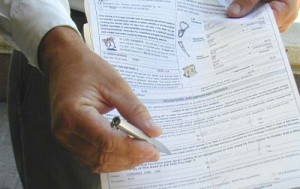Posted by Teresa on February 16, 2011 under Landlord Tips | 
 Landlords and tenants wrestle with certain issues more than others. Security deposits, rent due dates, and wear and tear are a few that seem to pop up the most. What a landlord considers damage, a tenant might view as “normal wear and tear.” Conversely, a tenant may think water damage is the landlord’s responsibility, while the rental property owner thinks it falls under the umbrella of tenant obligations.
Landlords and tenants wrestle with certain issues more than others. Security deposits, rent due dates, and wear and tear are a few that seem to pop up the most. What a landlord considers damage, a tenant might view as “normal wear and tear.” Conversely, a tenant may think water damage is the landlord’s responsibility, while the rental property owner thinks it falls under the umbrella of tenant obligations.
Here is a guide to help settle which is which when it comes to wear and tear:
| Normal Wear and Tear: |
Tenant Damage: |
| Minor scratch in wood floor |
Gouges or pet scratches in wood floor |
| Carpet indentation from furniture |
Torn carpeting |
| Worn areas in flooring, such as in doorways |
Burns or stains in flooring |
| Dirt on walls and floors |
Cigarette or food stains on walls and floors |
| Minor indentations on walls |
Holes or gouges that require repair |
| Water stains in bathroom |
Water damage from not reporting leaking pipe |
| Surface dust or dirt |
Layers of dirt from not cleaning |
| Dusty window blinds |
Broken window glass |
| Slow drains due to normal use |
Plugged-up drains from misuse |
| Cracks in tile due to age |
Broken tiles from heavy objects being dropped |
| Worn parts on appliances |
Missing parts on appliances |
Clearly, there are limitations to a landlord’s responsibility, whether a tenant doesn’t take proper care of a rental unit or an accident occurs. For example, a tenant may not be totally at fault for his friend’s dropping a bowling ball on the tile floor, but when it happens to someone else’s property, he who lives there must be held responsible.
And if a tenant can’t be bothered to clean her apartment, the landlord is entitled to have it done for her when she moves out—and deduct the fee from the security deposit.
On the other hand, it’s always up to the property owner to perform routine maintenance, which can go a long way to preventing bigger problems, like clogged pipes, water damage and worn out appliances.
Posted by Teresa on March 27, 2010 under Landlord Tenant Lawsuits, Landlord Tips | 
 Learning by others’ mistakes is a classic move. So read on for a few errors landlords can avoid—just because others have already made them.
Learning by others’ mistakes is a classic move. So read on for a few errors landlords can avoid—just because others have already made them.
Security deposits: Seems like security deposit issues are a top-5 cause of disputes between landlords and tenants. The problem can often be traced to miscommunications and unspoken expectations. Tenants sometimes assume they will receive 100% of their deposit back. It’s not their fault if they don’t understand how it works—it’s your job to fully explain the process, and what they stand to lose if they damage or otherwise alter the condition of the rental unit after they move in.
Have new tenants sign a statement that they have reviewed and understand your security deposit policy, move-in and move-out inspection lists, and then follow up with a thorough initial walk-through of the rental unit. Take photos and have tenants initial the condition of each item on the list. When they are ready to move out, schedule another walk-through with the tenant, establish damages and take more photos.
Failure to document, document, document. Keep pristine records—you never know when you’ll need them. Each tenant’s application, background screening and credit check report, lease documents and correspondence should be kept on file until three years after the end of the lease. Keep notes of emails and notes conversations, too (aside from the “nice day, huh?” conversations). Just keeping good records shows that you’re serious about your business—and someday, if you find yourself in front of a judge over a landlord/tenant dispute, it could work in your favor. It certainly can’t hurt!
Unintentional discrimination: Being discriminatory is not always a planned situation. Some landlords may mean well when asking a disabled tenant applicant about their wheelchair or asking if a 2 potential tenants plan to have children—but those questions themselves can be considered illegal. By avoiding personal questions of applicants, you could be avoiding possible legal trouble.
Not treating all tenants equally: Not only is it easier to be consistent in how you deal with tenants, it can also keep you safe legally. Don’t allow Tenant A to pay rent four days late when you never allow Tenant B a single day of leeway. Don’t enforce your “no smoking” rule for one tenant and not the others. Don’t fix a water drip immediately in the apartment of the tenant you like to talk to, but make an “unstable” tenant wait a week for a repair. Be fair and enforce all rules the same way to all your tenants. It’s easier to explain to a tenant that you’re sorry, but you have to apply the rules equally—and it can help you avoid a fair housing complaint, and a call to your lawyer!
 Landlords and tenants wrestle with certain issues more than others. Security deposits, rent due dates, and wear and tear are a few that seem to pop up the most. What a landlord considers damage, a tenant might view as “normal wear and tear.” Conversely, a tenant may think water damage is the landlord’s responsibility, while the rental property owner thinks it falls under the umbrella of tenant obligations.
Landlords and tenants wrestle with certain issues more than others. Security deposits, rent due dates, and wear and tear are a few that seem to pop up the most. What a landlord considers damage, a tenant might view as “normal wear and tear.” Conversely, a tenant may think water damage is the landlord’s responsibility, while the rental property owner thinks it falls under the umbrella of tenant obligations.
